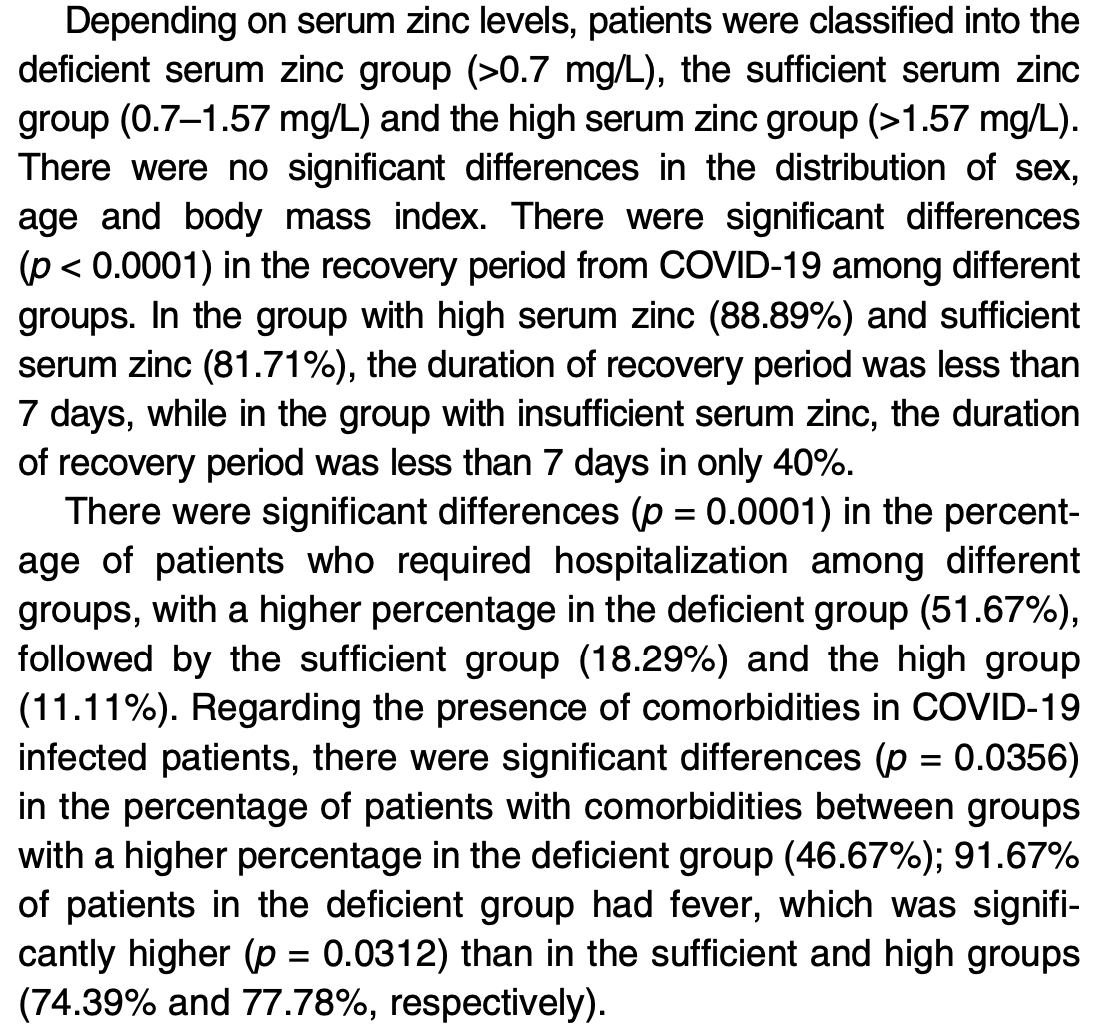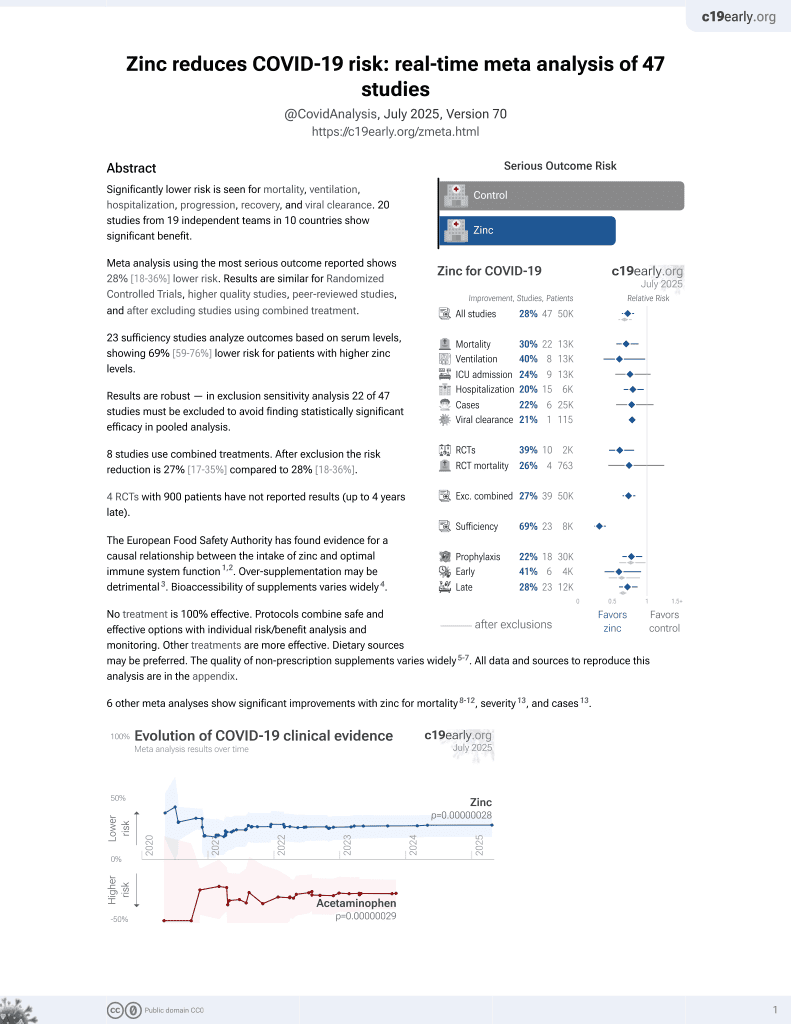
Relationship of serum zinc levels with severity and clinical presentation of COVID-19
et al., Infectious Diseases, 22:2, Jun 2022
Zinc for COVID-19
2nd treatment shown to reduce risk in
July 2020, now with p = 0.00000028 from 47 studies, recognized in 23 countries.
No treatment is 100% effective. Protocols
combine treatments.
6,400+ studies for
210+ treatments. c19early.org
|
Prospective study of 150 COVID-19 patients and 50 healthy controls in Iraq showing lower serum zinc levels associated with more severe COVID-19 outcomes. Patients with zinc deficiency (<0.7 mg/L) had longer recovery periods and higher rates of hospitalization compared to those with sufficient or high zinc levels. 40% of COVID-19 patients were zinc deficient.
|
risk of hospitalization, 65.6% lower, RR 0.34, p < 0.001, high zinc levels (≥0.7mg/L) 16 of 90 (17.8%), low zinc levels (<0.7mg/L) 31 of 60 (51.7%), NNT 3.0.
|
| Effect extraction follows pre-specified rules prioritizing more serious outcomes. Submit updates |
Haji et al., 28 Jun 2022, retrospective, Iraq, peer-reviewed, 2 authors.
Relationship of serum zinc levels with severity and clinical presentation of COVID-19
Infekcionnye bolezni, doi:10.20953/1729-9225-2024-2-87-91
О р и
Заключение При проведении дополнительных исследований цинк может стать экономически эффективной терапией для COVID-19.
Информация о финансировании Финансирование данной работы не проводилось.
Financial support No financial support has been provided for this work.
Конфликт интересов Авторы заявляют об отсутствии конфликта интересов.
Conflict of interests The authors declare that there is no conflict of interest.
Информированное согласие При проведении исследования было получено информированное согласие пациентов.
Informed consent In carrying out the study, written informed consent was obtained from all patients.
Информация о соавторе: Майтхам Али Аль-Рикаби, кафедра клинической фармации, фармацевтический колледж, Университет Басры, Басра, Ирак
Information about co-author: Maitham Ali Al-Rikabi, Department of Clinical Pharmacy, College of Pharmacy, University of Basrah, Basrah, Iraq
References
Akira, Uematsu, Takeuchi, Pathogen recognition and innate immunity, Cell, doi:10.1016/j.cell.2006.02.015
Arthur, Mckenziey, Beckett, Immunity enhanced by trace elements
Chen, Zhou, Dong, Qu, Gong et al., Epidemiological and clinical characteristics of 99 cases of 2019 novel coronavirus pneumonia in Wuhan, China: a descriptive study, Lancet, doi:10.1016/S0140-6736(20)30211-7
Devaux, Rolain, Raoult, ACE2 receptor polymorphism: Susceptibility to SARS-CoV-2, hypertension, multi-organ failure, and COVID-19 disease outcome, J Microbiol Immunol Infect, doi:10.1016/j.jmii.2020.04.015
Elham, Azam, Azam, Mostafa, Nasrin et al., Serum vitamin D, calcium, and zinc levels in patients with COVID-19, Clin Nutr ESPEN, doi:10.1016/j.clnesp.2021.03.040
Gammoh, Rink, Zinc in infection and inflammation, Nutrients, doi:10.3390/nu9060624
Huang, Wang, Li, Ren, Zhao et al., Clinical features of patients infected with 2019 novel coronavirus in Wuhan, China, Lancet, doi:10.1016/S0140-6736(20)30183-5
Jain, Chaurasia, Sengar, Singh, Mahor et al., Analysis of vitamin D level among asymptomatic and critically ill COVID-19 patients and its correlation with inflammatory markers, Sci Rep, doi:10.1038/s41598-020-77093-z
Jothimani, Kailasam, Danielraj, Nallathambi, Ramachandran et al., COVID-19: Poor outcomes in patients with zinc deficiency, Int J Infect Dis, doi:10.1016/j.ijid.2020.09.014
Ko, Morihara, Shibata, Yamauchi, Fukuda et al., Factors attenuating zinc deficiency improvement in direct-acting antiviral agent-treated chronic hepatitis C virus infection, Nutrients, doi:10.3390/nu10111620
Kumar, Kubota, Since January
Lian, Zang, Wei, Ye, Hu et al., The zinc-finger protein ZCCHC3 binds RNA and facilitates viral RNA sensing and activation of the RIG-Ilike receptors, Immunity, doi:10.1016/j.immuni.2018.08.014
Ong, Pérusse, Impact of nutritional epigenomics on disease risk and prevention: introduction, J Nutrigenet Nutrigenomics, doi:10.1159/000334813
Overbeck, Rink, Haase, Modulating the immune response by oral zinc supplementation: a single approach for multiple diseases, Arch Immunol Ther Exp (Warsz), doi:10.1007/s00005-008-0003-8
Pecora, Persico, Argentiero, Neglia, Esposito, The role of micronutrients in support of the immune response against viral infections, Nutrients, doi:10.3390/nu12103198
Rahman, Idid, Can Zn be a critical element in COVID-19 treatment?, Biol Trace Elem Res, doi:10.1007/s12011-020-02194-9
Read, Obeid, Ahlenstiel, Ahlenstiel, The role of zinc in antiviral immunity, Adv Nutr, doi:10.1093/advances/nmz013
Singh, Can vitamins, as epigenetic modifiers, enhance immunity in COVID-19 patients with non-communicable disease?, Curr Nutr Rep, doi:10.1007/s13668-020-00330-4
Velthuis, Van Den Worm, Sims, Baric, Snijder et al., Zn(2+) inhibits coronavirus and arterivirus RNA polymerase activity in vitro and zinc ionophores block the replication of these viruses in cell culture, PLoS Pathog, doi:10.1371/journal.ppat.1001176
Wessels, Rolles, Rink, The potential impact of zinc supplementation on COVID-19 pathogenesis, Front Immunol, doi:10.3389/fimmu.2020.01712
Wong, Lam, Wu, Ip, Lee et al., Plasma inflammatory cytokines and chemokines in severe acute respiratory syndrome, Clin Exp Immunol, doi:10.1111/j.1365-2249.2004.02415.x
Wu, Mcgoogan, Characteristics of and important lessons from the coronavirus disease 2019 (COVID-19) outbreak in China: summary of a report of 72 314 cases from the Chinese Center for Disease Control and Prevention, JAMA, doi:10.1001/jama.2020.2648
Xue, Moyer, Peng, Wu, Hannafon et al., Chloroquine is a zinc ionophore, PLoS One, doi:10.1371/journal.pone.0109180
